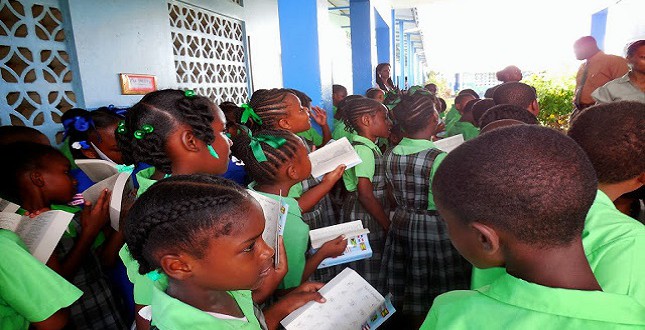The Day Tucker-Clarke Primary School Receives Dictionaries
BASSETERRE, St. Kitts – THE DAY was Wednesday October 16, 2013 and all the Grade III students and their teachers of Tucker Clarke Primary School assembled at 9.00 a.m.at their school and awaited the arrival of members of the Rotary Club of St. Kitts.
During that week, every Primary School was being visited by members of the Rotary Club of St. Kitts. With their ‘Dictionary Project’, the Rotarians were hoping to make an impact on Education in St. Kitts by distributing dictionaries to every Grade III student on the island.
Principal of Tucker Clarke Primary, Mr. Sylvester Charles welcomed the Rotarians and introduced them to the students and teachers assembled. It just so happened that the two Rotarians were veteran teachers themselves.
Mr. William Dore was himself a Principal of the Basseterre Boys School (now incorporated into the Beach Allen Primary School) and Dr. Burnell Nisbett had been a teacher at the Grammar School and the Basseterre High School before becoming a veterinarian. They were therefore on familiar ground and seemed to relish being in the school atmosphere once again.
Addressing the eager-eyed students, Mr. Dore first told them of the services Rotary had been offering to the country, citing examples. Rotary now wanted to put a dictionary into the hands of every third grade student.
“This is very interesting to me,” said the veteran headmaster, “because I got my first book which I bought long, long ago for one shilling, and would you believe I still have that book?
I am telling you that because I want you to understand that when you get your book, your dictionary, you don’t damage it, you don’t misuse it, throw it away, but you keep it and make proper use of it for your education…don’t give it away, don’t lose it, don’t smash it up, right?”
Dr. Nisbett, in introducing the book, informed them that this is a special Caribbean edition of the Dictionary… ‘it is an English dictionary with English spelling and not American spelling’. He emphasized that the dictionary was to be their personal book and they should always have it in their bags and take good care of it.
He further drew attention the Rotary’s pledge or Four Way Test that was imprinted in the front of the book under the student’s name. He explained “Before you think or say anything, ask yourself, ‘Is it the truth? Is it fair to all concerned? Will it build goodwill and better friendships? Will it be beneficial to all concerned? He hoped by considering these questions that they would be reminded to be good persons and to be good to one another.
Each Grade III student was then called up by name and individually handed the Dictionary for their personal use. A dictionary was also presented to each teacher for the three Grade III classrooms.
When asked if they knew how to use a dictionary, the students shouted “Yes!” Some interaction followed when they were asked to find the word “beneficial”. This produced a shuffle of leaf turning and the first student finding that word was asked to come to the front to read the meaning.
Appreciation to the Rotarians was expressed by a Grade III teacher who gave the vote of thanks Rotary’s ‘Dictionary Project’ was launched on Monday 14th October 2013 and is sponsored by the Christophe Harbour Foundation.
The ‘Dictionary Project is being carried out in fifteen countries and so far 18 million dictionaries have been distributed. Research has shown that a better vocabulary leads to a better chance of succeeding in one’s studies and the long term goal of the Project is to help students to become ‘good writers, active readers, creative thinkers and resourceful learners’.
The goal and its method of accomplishment are echoed in the words of Malala Yousafzai, the teenager who has been sacrificing her life in the cause of education for girls. She maintains:
“One child, one teacher, one book, and one pen can change the world.”






